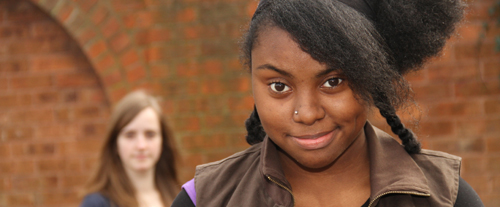Islam
With around 1.7 billion followers, Islam is the world's second largest major religion. From the teachings of the Prophet Muhammad, Islam was founded at the start of the 7th Century. Below is information on the most common beliefs on the subject of relationships and sex.


Gender Roles
In Islam, women and men have spiritual equality and value in the eyes of Allah. In terms of spiritual and religious duties, such as belief in Allah and his Messenger, praying, fasting, paying Zakat, making Hajj; the requirements for men and women are the same. In some cases women have certain allowances because of their health or the health of their babies.
Islam has a distinction between the roles of men and women. Men and women are considered to have some physical differences and they both have their unique strengths. As a result of this distinction, men are given the public sphere of life and women are given the private sphere. Men are expected fulfil public duties and to provide for their wives and children and to adopt a caretaking role for their family. The Prophet (pbuh) also used to assist in the household chores and help his family after fulfilling his public duties.
Women are expected to fulfil duties of the private sphere; however there is no restriction in Islam to say that a woman’s only place is in the home. Islam places high importance on both women and men to seek knowledge and education. A woman can work and have a career if she chooses to. It is a requirement for an Islamic society to have female doctors, nurses, teachers etc due to the Islamic requirement for the separation of the sexes. A woman is considered a legal person who has the right to her own identity, is allowed to vote, own wealth and inherit.
Islam gives a very high value to the role of mother. Women are expected to nurture their children and to ensure that they become good Muslims and well-mannered. In Islam mothers have a status three times higher than that of fathers.

Gender Roles
In Islam, women and men have spiritual equality and value in the eyes of Allah. In terms of spiritual and religious duties, such as belief in Allah and his Messenger, praying, fasting, paying Zakat, making Hajj; the requirements for men and women are the same. In some cases women have certain allowances because of their health or the health of their babies.
Islam has a distinction between the roles of men and women. Men and women are considered to have some physical differences and they both have their unique strengths. As a result of this distinction, men are given the public sphere of life and women are given the private sphere. Men are expected fulfil public duties and to provide for their wives and children and to adopt a caretaking role for their family. The Prophet (pbuh) also used to assist in the household chores and help his family after fulfilling his public duties.
Women are expected to fulfil duties of the private sphere; however there is no restriction in Islam to say that a woman’s only place is in the home. Islam places high importance on both women and men to seek knowledge and education. A woman can work and have a career if she chooses to. It is a requirement for an Islamic society to have female doctors, nurses, teachers etc due to the Islamic requirement for the separation of the sexes. A woman is considered a legal person who has the right to her own identity, is allowed to vote, own wealth and inherit.
Islam gives a very high value to the role of mother. Women are expected to nurture their children and to ensure that they become good Muslims and well-mannered. In Islam mothers have a status three times higher than that of fathers.

Growing Up
In Islam, everyone becomes responsible for their behavior and actions once they reach the age of puberty. When a young person reaches puberty they will be expected to follow the laws of Islam and worship like an adult.
The Islamic definition of puberty (bulugh) is based on three things:
Firstly age; a girl is considered to have reached puberty after nine lunar years, and for a boy it is fifteen lunar years.
Secondly internal body change; a girl has reached puberty once she starts having periods and for a boy it is when he has involuntary ejaculations (wet dreams).
Thirdly external physical changes; both sexes are considered to have reached puberty once their bodies start developing and they develop pubic hair.
Young men are required to wash regularly, remove pubic and under arm hair, and after having a wet dream he should perform ghusal. Ghusal is the ritual bathing Muslims have to do after having sex, the release of sexual body fluids e.g. semen, periods, and after giving birth. A young woman should wash regularly, remove pubic and under arm hair and after having a period she should perform ghusal.
In addition to the practical and physical requirements of Islam, young people are also expected to develop moral and spiritual values. Islam requires men and women to treat one another with respect, behave and dress modestly, and interact with each other within the boundaries of Islamic etiquette. This means boys and girls are expected to be virtuous and not have intimate and sexual relations before they are married.
Growing Up
In Islam, everyone becomes responsible for their behavior and actions once they reach the age of puberty. When a young person reaches puberty they will be expected to follow the laws of Islam and worship like an adult.
The Islamic definition of puberty (bulugh) is based on three things:
Firstly age; a girl is considered to have reached puberty after nine lunar years, and for a boy it is fifteen lunar years.
Secondly internal body change; a girl has reached puberty once she starts having periods and for a boy it is when he has involuntary ejaculations (wet dreams).
Thirdly external physical changes; both sexes are considered to have reached puberty once their bodies start developing and they develop pubic hair.
Young men are required to wash regularly, remove pubic and under arm hair, and after having a wet dream he should perform ghusal. Ghusal is the ritual bathing Muslims have to do after having sex, the release of sexual body fluids e.g. semen, periods, and after giving birth. A young woman should wash regularly, remove pubic and under arm hair and after having a period she should perform ghusal.
In addition to the practical and physical requirements of Islam, young people are also expected to develop moral and spiritual values. Islam requires men and women to treat one another with respect, behave and dress modestly, and interact with each other within the boundaries of Islamic etiquette. This means boys and girls are expected to be virtuous and not have intimate and sexual relations before they are married.


Marriage
The Islamic term for the wedding ceremony is Nikkah. Marriage is one of the most important moments in the life of a Muslim.
The Prophet (pbuh) said in a Hadith that people look for marriage partners based on wealth, beauty, status and lastly Taqwa (religious piety). He explained that the level of Taqwa in the person should be the first priority.
People looking to get married or who are having their marriage arranged can see each other, talk to each other and get to know each other for days, weeks or even months. However, there should be a chaperone nearby or they should meet in a public place. According to the Prophet (pbuh), no one can be forced to marry someone they don’t want to. It must be a free choice on the part of both people concerned and only then can the wedding be performed.
If the man and woman agree to marry, then a formal engagement is announced and a wedding date is set. An Imam performs the wedding ceremony. The bride is represented by her Wali, or protective guardian who will give her away.

Marriage
The Islamic term for the wedding ceremony is Nikkah. Marriage is one of the most important moments in the life of a Muslim.
The Prophet (pbuh) said in a Hadith that people look for marriage partners based on wealth, beauty, status and lastly Taqwa (religious piety). He explained that the level of Taqwa in the person should be the first priority.
People looking to get married or who are having their marriage arranged can see each other, talk to each other and get to know each other for days, weeks or even months. However, there should be a chaperone nearby or they should meet in a public place. According to the Prophet (pbuh), no one can be forced to marry someone they don’t want to. It must be a free choice on the part of both people concerned and only then can the wedding be performed.
If the man and woman agree to marry, then a formal engagement is announced and a wedding date is set. An Imam performs the wedding ceremony. The bride is represented by her Wali, or protective guardian who will give her away.

Sex
According to Islam, sexuality is a natural part of our identity as human beings. For Muslims, sexual relations are only allowed within a marriage between a wife and husband.
Having and raising children is important, however sex is not only intended for reproduction. Sex within marriage is to create tenderness between two people. Sex between two people who are married is a form of worship which they will be rewarded for.
The Prophet (pbuh) spoke about the importance of foreplay and speaking to partners in loving terms. He advised husbands to take care that their wives achieve orgasm and enjoy intimacy. With the exception of anal sex, everything a married couple agree and consent to is allowed.
Islam does not allow men and women to have sex outside of marriage. The reason for this is that there can be negative consequences in having pre-marital sex. Some of the consequences can include things such as unwanted pregnancies, sexually transmitted infections and negative impact on family relationships. Because the process that leads to physical attraction and sexual intimacy is part of human nature, Muslims are advised to avoid circumstances that could result in sex outside marriage.
Masturbation
With regards to masturbation, there are different views on whether it is allowed or forbidden. Most Islamic schools of thought take the view that masturbation is forbidden or at least disliked, however they allow it to take place when it is considered a necessity. For example, someone who is unmarried could masturbate as a last resort as a way of avoiding having sex outside of marriage. However, masturbation is not acceptable during daylight hours in Ramadan because it is seen as breaking the fast.
Sex
According to Islam, sexuality is a natural part of our identity as human beings. For Muslims, sexual relations are only allowed within a marriage between a wife and husband.
Having and raising children is important, however sex is not only intended for reproduction. Sex within marriage is to create tenderness between two people. Sex between two people who are married is a form of worship which they will be rewarded for.
The Prophet (pbuh) spoke about the importance of foreplay and speaking to partners in loving terms. He advised husbands to take care that their wives achieve orgasm and enjoy intimacy. With the exception of anal sex, everything a married couple agree and consent to is allowed.
Islam does not allow men and women to have sex outside of marriage. The reason for this is that there can be negative consequences in having pre-marital sex. Some of the consequences can include things such as unwanted pregnancies, sexually transmitted infections and negative impact on family relationships. Because the process that leads to physical attraction and sexual intimacy is part of human nature, Muslims are advised to avoid circumstances that could result in sex outside marriage.
Masturbation
With regards to masturbation, there are different views on whether it is allowed or forbidden. Most Islamic schools of thought take the view that masturbation is forbidden or at least disliked, however they allow it to take place when it is considered a necessity. For example, someone who is unmarried could masturbate as a last resort as a way of avoiding having sex outside of marriage. However, masturbation is not acceptable during daylight hours in Ramadan because it is seen as breaking the fast.


Contraception
In Islam having children is encouraged and they are considered a gift from Allah. However women are allowed to decide for themselves whether or not they want a child.
The method of contraception used during the time of the Prophet (pbuh) was 'azl’ or the withdrawal method (please note this method has an extremely high failure rate!). His response when people asked him if such a practice was lawful was that individuals can do as they will, but if God intends for a child to be born, she/he will be born.
The general consensus amongst Muslims is that the methods of contraception allowed in Islam are the reversible contraceptive methods; this includes hormonal contraceptives such as the pill, as well as condoms and caps/diaphragms. Irreversible methods of contraception such as sterilisation are not allowed.

Contraception
In Islam having children is encouraged and they are considered a gift from Allah. However women are allowed to decide for themselves whether or not they want a child.
The method of contraception used during the time of the Prophet (pbuh) was 'azl’ or the withdrawal method (please note this method has an extremely high failure rate!). His response when people asked him if such a practice was lawful was that individuals can do as they will, but if God intends for a child to be born, she/he will be born.
The general consensus amongst Muslims is that the methods of contraception allowed in Islam are the reversible contraceptive methods; this includes hormonal contraceptives such as the pill, as well as condoms and caps/diaphragms. Irreversible methods of contraception such as sterilisation are not allowed.

Termination of Pregnancy
Within Islam, abortion is not considered acceptable unless the mother’s life is endangered. Her life is considered to be more significant than that of her embryo if her life or health is put at risk by the pregnancy. In this situation her position in the family with itsattendant responsibilities is more important than the potential of life residing within the embryo. This is the only circumstance where termination is lawful within Islam. A belief that the soul does not enter the foetus until the 120th day of gestation indicates that an abortion should be carried out before this time.
Pregnancy for a Muslim girl outside of marriage would realistically only have two culturally acceptable responses: either to announce who the father of the baby is, marry him and begin a lifelong relationship together (providing he is Muslim; otherwise he would have to convert to Islam in order for the girl and him to continue being welcome in the family), or to have a termination, privately and thereby not bring herself or the family into disrepute. It would depend greatly on individual parents as to whether a daughter would be accompanied to and through an abortion.
The Qur'an does not explicitly refer to abortion but offers guidance on related matters. Scholars accept that this guidance can properly be applied to abortion. The Qur'an states: ‘Whosoever has spared the life of a soul, it is as though he has spared the life of all people. Whosoever has killed a soul, it is as though he has murdered all of mankind.’ Qur'an 5:32
Islam allows abortion to save the life of the mother because it sees this as the 'lesser of two evils' and there is a general principle in Sharia (Muslim law) of choosing the lesser of two evils.
Islam forbids the termination of a pregnancy after soul or 'Ruh' is given to the foetus. There is disagreement within Islam as to when this happens. The three main opinions are at 120 days, 40 days or when there is voluntary movement of the foetus. It is important to note that many scholars believe that life begins at conception, and that all scholars believe that an embryo deserves respect and protection at all stages of the pregnancy.
The core values underpinning Islamic beliefs include: purity, charity, piety, commitment, virtue, honour, responsibility, respect, acceptance, self-discipline.
Termination of Pregnancy
Within Islam, abortion is not considered acceptable unless the mother’s life is endangered. Her life is considered to be more significant than that of her embryo if her life or health is put at risk by the pregnancy. In this situation her position in the family with itsattendant responsibilities is more important than the potential of life residing within the embryo. This is the only circumstance where termination is lawful within Islam. A belief that the soul does not enter the foetus until the 120th day of gestation indicates that an abortion should be carried out before this time.
Pregnancy for a Muslim girl outside of marriage would realistically only have two culturally acceptable responses: either to announce who the father of the baby is, marry him and begin a lifelong relationship together (providing he is Muslim; otherwise he would have to convert to Islam in order for the girl and him to continue being welcome in the family), or to have a termination, privately and thereby not bring herself or the family into disrepute. It would depend greatly on individual parents as to whether a daughter would be accompanied to and through an abortion.
The Qur'an does not explicitly refer to abortion but offers guidance on related matters. Scholars accept that this guidance can properly be applied to abortion. The Qur'an states: ‘Whosoever has spared the life of a soul, it is as though he has spared the life of all people. Whosoever has killed a soul, it is as though he has murdered all of mankind.’ Qur'an 5:32
Islam allows abortion to save the life of the mother because it sees this as the 'lesser of two evils' and there is a general principle in Sharia (Muslim law) of choosing the lesser of two evils.
Islam forbids the termination of a pregnancy after soul or 'Ruh' is given to the foetus. There is disagreement within Islam as to when this happens. The three main opinions are at 120 days, 40 days or when there is voluntary movement of the foetus. It is important to note that many scholars believe that life begins at conception, and that all scholars believe that an embryo deserves respect and protection at all stages of the pregnancy.
The core values underpinning Islamic beliefs include: purity, charity, piety, commitment, virtue, honour, responsibility, respect, acceptance, self-discipline.


Divorce
Islam recognises that lifelong marriage is not always possible and provides laws for divorce. Divorce is accepted and referred to as talaq. Sometimes people think that a married Muslim man can divorce his wife simply by saying talaq three times, however this is a controversial practice and is against the teachings of Islam.]
In Islam, Marriage is a sacred bond and divorce should only be used as a last resort. If a husband and wife are having marriage difficulties, as a first step they should appoint mediators to resolve the conflict. If this does not work, then either the husband or wife can ask for a divorce.
Khula is the right of a woman to divorce her husband. She can ask her husband to divorce her, and if the husband refuses, she can go to an Islamic court to ask for a divorce. A man can divorce his wife following a procedure set by Islamic law. The man must claim that he wants to divorce his wife three times, within a three-month period. After getting divorced, the man is required to financially support the woman and his children.

Divorce
Islam recognises that lifelong marriage is not always possible and provides laws for divorce. Divorce is accepted and referred to as talaq. Sometimes people think that a married Muslim man can divorce his wife simply by saying talaq three times, however this is a controversial practice and is against the teachings of Islam.]
In Islam, Marriage is a sacred bond and divorce should only be used as a last resort. If a husband and wife are having marriage difficulties, as a first step they should appoint mediators to resolve the conflict. If this does not work, then either the husband or wife can ask for a divorce.
Khula is the right of a woman to divorce her husband. She can ask her husband to divorce her, and if the husband refuses, she can go to an Islamic court to ask for a divorce. A man can divorce his wife following a procedure set by Islamic law. The man must claim that he wants to divorce his wife three times, within a three-month period. After getting divorced, the man is required to financially support the woman and his children.

Homosexuality
Islam has clear and explicit rules regarding sex and sexuality. Sex is only allowed within a marriage, and an Islamic marriage can only take place between a man and a woman. Islam does not allow sex before marriage or for people to have anal sex. These rules apply equally for both straight and gay people.
If someone does have feelings of attraction towards members of the same sex, this is not considered sinful. In Islam, having thoughts or feelings which are against the teachings of Islam is not a sin, it is only your voluntary actions which can be a sin.
Muslims who are attracted to members of the same sex are expected to resist their desires and struggle against them. Struggling to keep your desires in check for the sake of Allah’s pleasure is considered jihad bin nafs, a sacred struggle against ones ego. The person who does this successfully receives spiritual illumination and a great reward and honour in the eyes of Allah.
Homosexuality
Islam has clear and explicit rules regarding sex and sexuality. Sex is only allowed within a marriage, and an Islamic marriage can only take place between a man and a woman. Islam does not allow sex before marriage or for people to have anal sex. These rules apply equally for both straight and gay people.
If someone does have feelings of attraction towards members of the same sex, this is not considered sinful. In Islam, having thoughts or feelings which are against the teachings of Islam is not a sin, it is only your voluntary actions which can be a sin.
Muslims who are attracted to members of the same sex are expected to resist their desires and struggle against them. Struggling to keep your desires in check for the sake of Allah’s pleasure is considered jihad bin nafs, a sacred struggle against ones ego. The person who does this successfully receives spiritual illumination and a great reward and honour in the eyes of Allah.

